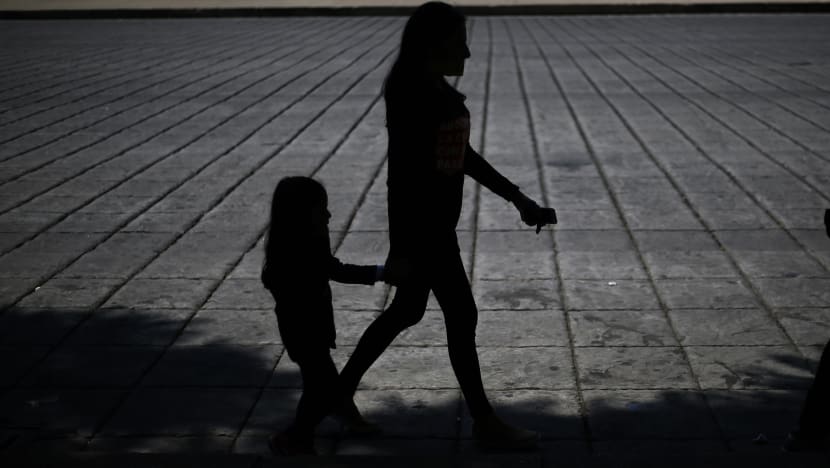Child sex offenders generally lack remorse: Psychiatrist

Cases of sexual abuse allegations involving children under the age of 16 have increased in Singapore, with the Ministry of Social and Family Development investigating 107 allegations of child sexual abuse last year, up from 56 in 2014. Photo: AP
SINGAPORE — Many child sex offenders are unlikely to feel remorse or guilt for their behaviour and very few think of themselves as wicked people, said experts.
And while some experts believe paedophilia – the biggest risk factor for sexual violence against the young – is a sexual orientation, they stressed it cannot excuse or justify irresponsible or criminal behaviour.
Paedophiles are individuals with a sexual preference for prepubescent children generally no older than age 13. There is another group called hebephiles, who are sexually attracted to children who have started puberty but who are still developing.
Cases of sexual abuse allegations involving children under the age of 16 have increased in Singapore, with the Ministry of Social and Family Development investigating 107 allegations of child sexual abuse last year, up from 56 in 2014.
A new book featuring the stories of 12 survivors of child sexual abuse, among them a Singaporean, will be launched here on Wednesday (Nov 15). Survivors: Breaking The Silence On Child Sexual Abuse is co-authored by child rights advocate Eirliani Abdul Rahman and child psychiatrist Daniel Fung.
Paedophilia and child sexual abuse are not synonymous, said Associate Professor John Elliott from the Department of Psychology at National University of Singapore (NUS). Not all paedophiles are child sex offenders, and vice versa. Some sexual offences against children are committed opportunistically.
Research suggests that people with sustained sexual interest in children have some form of organic dysfunction in the brain, said Assoc Prof Elliott.
“This may indicate that you are looking at a group of people who might have had some changes to their brain development, for example, exposure to abnormal levels of hormones before they were born. Some studies suggest that childhood trauma could disturb the serotonin system,” said Assoc Prof Elliott.
While sexual preference lies in the brain, its exact neuroanatomy and neurophysiology are unclear, said Dr Kenneth Koh, senior consultant at the department of general and forensic psychiatry at the Institute of Mental Health (IMH).
“More important is the fact that while individuals may be ‘wired’ with certain sexual preference, the choice to behave in a certain way with regards to sexual activity still fully remains intact,” said Dr Koh.
MANY CHILD SEX ABUSERS RE-OFFEND
Many offenders will groom children to entice them into sexual behaviour and rationalise that their behaviour is appropriate, said Dr Koh, who is part of the IMH team that sees such offenders.
“For instance, they may say they are teaching the children, blame the victims for making sexual advances or say that the child likes the activity,” he said.
Awareness and admitting the problem are the first steps towards protecting children from sexual abuse, said Assoc Prof Elliott, who has conducted research on the topic.
But the lack of remorse among many could be a reason why recidivism rates among child sex offenders are often high, even after rehabilitative efforts, said Dr Koh. Some overseas studies suggest around 20 to 50 per cent of them may reoffend, he said.
Although women may also sexually abuse children, the cases the IMH team sees are usually men. Most of them are referred by the prison psychiatrist or through IMH’s Forensic Psychiatric Community Service, which picks up cases that may benefit from psychiatric follow-up upon completion of prison sentences.
IMH was unable to provide the number of cases it sees as it does not track statistics of such offenders. Dr Koh has only seen one case – a male in his late teens – who actively sought treatment as he was distressed by his sexual attraction to children.
For those who find themselves sexually drawn to children, Assoc Prof Elliott said the onus is on them not to put themselves in situations where they can be tempted.
“It’s your responsibility to conduct yourself in a responsible manner in a civilised society. You have to take steps to make sure nothing happens, and not put yourself in a manner that is likely to create bad consequences for other people and yourself,” he said.
Society and one’s family have a role to play. “A lot of people are still so shocked to find out that a family member might be afflicted by these desires. It’s not something they think about, or want to think about. They won’t be looking out for any signs even if there were any to see,” said Assoc Prof Elliott.
Treatment is possible, especially if the person experiences distress over the sexual attractions to children, said Dr Koh. He urged those with paedophiliac tendencies to consult a psychiatrist. Medical consultations are confidential unless the offences have occurred.
“If the patient… wants to be rid of that distress and seeks treatment, that’s half the battle won. He will be more willing to engage in treatment and take suggestions on how to deal with his thoughts, feelings and behaviour,” he said.
Treatments for child sex offenders include psychotherapy, which typically involves using principles and approaches from cognitive behavioural therapy. However, a big factor is the patient’s motivation, said Dr Kenji Gwee, principal clinical forensic psychologist at IMH.
“Psychotherapy is not something administered to the patient like an injection, but rather an aid that a willing patient must maximise to derive benefits from. Possibly as such, the outcomes for child sexual abusers, where psychotherapy is concerned, are not particularly impressive,” said Dr Gwee.
In Singapore, there is also the option of chemical castration through the use of medication. It is available to child sex offenders on a voluntary basis, said Dr Koh.
The medications, which may be prescribed by a psychiatrist, help “dull” libido and reduce sexual activity, he said.











